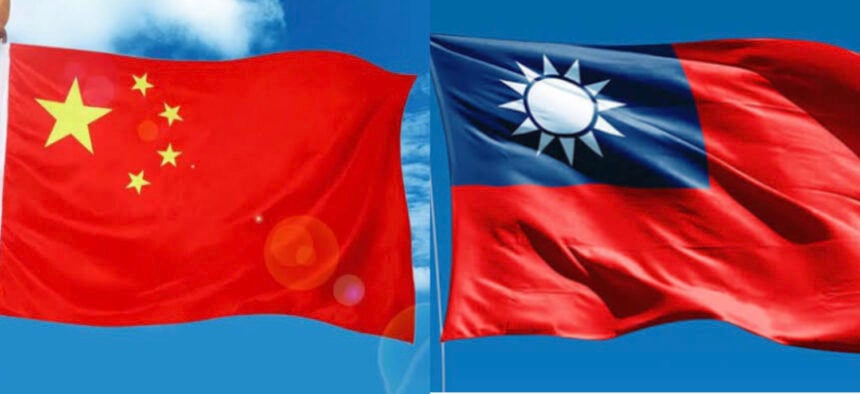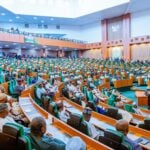The People’s Republic of China has reiterated its strong opposition to Taiwan independence, stating that it is a serious threat to the country’s sovereignty and territorial integrity.
It said the Taiwan question concerns China’s sovereignty, territorial integrity, and China’s national sentiment without any ambiguity and cannot be argued or challenged.
The Chief of Political Section of the Chinese Embassy in Nigeria, Zhu Songbo, in his remarks at the Media Salon on the One-China Principle as the Bedrock of China- Nigeria Relations on Thursday in Abuja, explained that the one-China principle, which asserts that there is only one China in the world, Taiwan is an inalienable part of China’s territory, and the government of the People’s Republic of China is the only legitimate government representing all of China.
Songbo added that the application of the one-China principle is universal, unconditional, and unquestionable stressing that all countries that have diplomatic relations with China and all member states of the United Nations must unconditionally adhere to the one-China principle.
ALSO READ: Bill Gates set to give away ‘virtually all’ his wealth.
Regarding Nigeria’s stance on the Taiwan question, Zhu appreciated the country’s commitment to the one-China principle, citing Nigeria’s actions, including the relocation of the Taiwan Trade Office out of Abuja.
“Nigeria has been adhering to the one-China principle, which has been appreciated by China.
“We hope that Nigeria will continue to uphold this principle and support China’s efforts to achieve national reunification.”
Zhu also cautioned media practitioners against using language that implies Taiwan’s independence or sovereignty, urging them to adhere to the principles of objectivity, fairness, and truthfulness when reporting on China and the Taiwan question.
“We hope that all of you will have a better understanding of China’s position on the Taiwan question and will continue adhering to the principles of objectivity, fairness, and truthfulness when writing reports about China,” Songbo added.
Songbo further expressed concern over attempts by some forces to promote Taiwan independence, describing such efforts as a serious threat to peace and stability in the Taiwan Strait.
“The Taiwan independence separatist activities and external forces are a threat to peace and stability across the Taiwan Strait.
“We firmly oppose any attempts to create a ‘two Chinas’ or ‘one China, one Taiwan’ scenario.”
Songbo, therefore, reaffirmed China’s commitment to peaceful reunification, while also emphasizing the importance of maintaining stability and security in the region.
“We are committed to peaceful reunification, but we will not tolerate any attempts to undermine China’s sovereignty and territorial integrity.
“We hope that all parties will work together to promote peace and stability in the region.”
Earlier in his presentation, the Director of Centre for China Studies, Charles Onunaiju, said the Chinese and Taiwanese are, in fact, one people, sharing a common history and cultural heritage.
He noted that Nigeria’s position on the One-China principle is sacrosanct, as evidenced by its commitment to recognizing the People’s Republic of China as the sole legitimate government representing all of China.
According to him, “The Taiwan Trade Office in Lagos operates merely as a trade facilitation entity, and not as an embassy, with its primary purpose being to promote economic and commercial ties between Taiwan and Nigeria.
He, However, said the activities of the Taipei Trade Office have been known to undermine Nigeria’s adherence to the One-China principle, which could potentially strain bilateral relations between Nigeria and China.
“Ultimately, Taiwan’s eventual return to China is an inseparable part of history, as the island has been an integral part of Chinese territory since ancient times, and reunification is seen as a necessary step towards realizing the country’s sovereignty and territorial integrity.”
Also, the Head of the Department of Political Science and International Relations at the University of Abuja, Professor Sheriff Ghali Ibrahim, in his presentation said no country will allow secessionist groups to undermine its sovereignty and territorial integrity, and China is no exception in its stance against Taiwan independence.
Prof. Ghali Ibrahim who is also the Director of Centre for Contemporary China-Africa Research, said the United Nations Resolution 2758 of 1971 recognizes the People’s Republic of China (PRC) as the only legal representative of China, with Taiwan considered an integral part of it, a position reinforced by several other laws and frameworks that support the One-China policy, including anti-secession laws.
He said, “The concept of “One Country, Two Systems” was propounded by Deng Xiaoping, aimed at achieving peaceful reunification while allowing for different systems to coexist within a unified China.”
“Nigeria adheres to the principle of non-interference in the internal affairs of other countries, and as such, will not meddle in China’s internal affairs, including the Taiwan question.”
“China and Nigeria share similar ideas and identity, and as a result, efforts by the Taiwan Trade Office to undermine the One-China principle are likely to fail, given the strong bilateral relations between Nigeria and China.”
“The One-China principle has been pivotal to the significant increase in trade volume between Nigeria and China, with trade exceeding over $20 billion, making China Nigeria’s third-largest trade partner.”
“Furthermore, there have been tangible outcomes in terms of infrastructural interventions from the Chinese government, including the construction of rails and roads, which have contributed to Nigeria’s economic development.”
Dr Austin Maho who is a lecturer at the International Institute of Journalism in his presentation on the role of the Nigerian media in Reporting the Taiwan Question, stated that the media plays a critical role in shaping society and public perception, and as such, journalists should exercise caution and responsibility in their reporting, particularly on sensitive issues such as the Taiwan question.
Maho who is also a newspapers’ publisher also said the People’s Republic of China considers Taiwan independence as a red line that should not be crossed, and journalists should be mindful of this in their reportage.
“To provide accurate and balanced coverage, journalists should thoroughly understand the issues between Nigeria and China, avoiding references to Taiwan as a “country” or calling for enhanced collaboration between Nigeria and Taiwan.
“Media professionals should also be wary of Andy Ping Liu, representative of the Taiwan trade mission in Nigeria, who may attempt to promote Taiwan independence.
“Vigilance is key among media professionals to ensure that their reporting does not inadvertently undermine the One-China principle or promote secessionist agendas”, he added.






